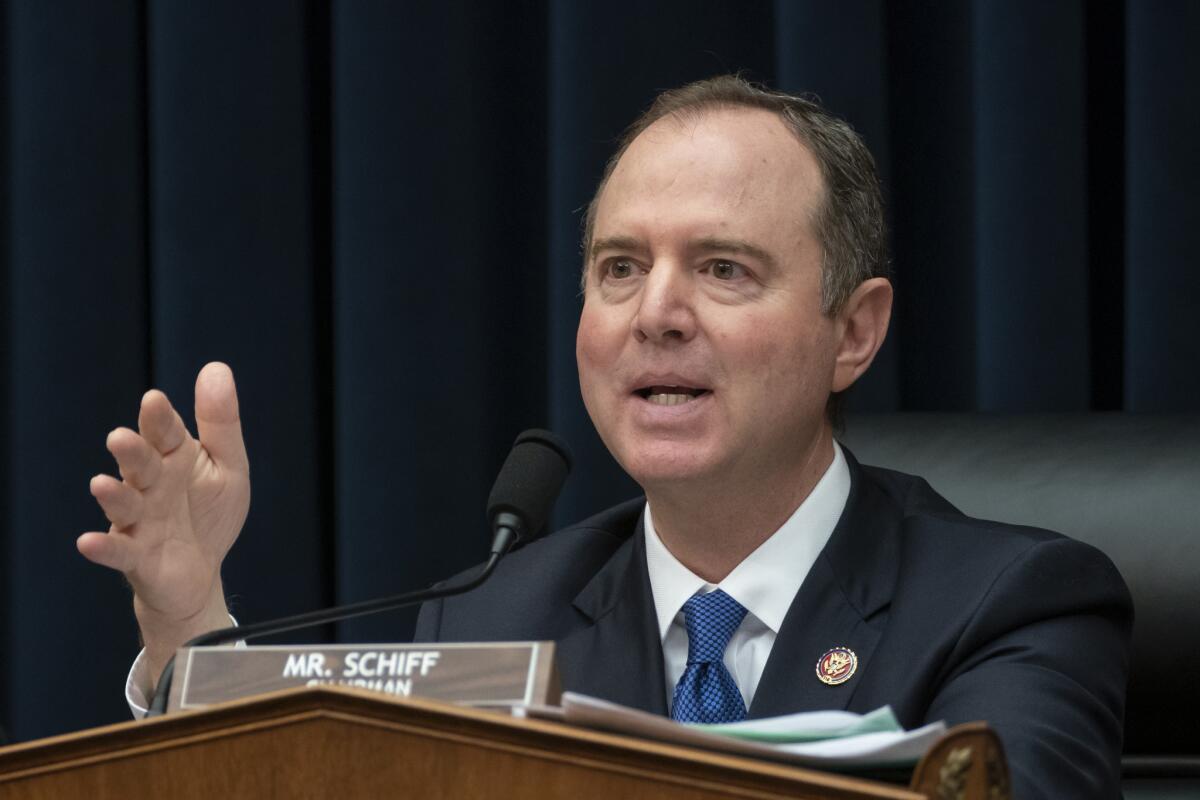Column: Robert Mueller’s hearings were heading nowhere — until Adam Schiff spoke up

During the House Judiciary Committee’s hearing on Wednesday morning, Republicans badgered Robert S. Mueller III with sticky names that they often mispronounced. Joseph Mifsud. Natalia Veselnitskaya. Peter Strzok. The special counsel’s investigation, they bellowed, was somehow ill-intentioned. Mueller looked at them blankly.
The Democrats, meanwhile, mansplained the Mueller report to the man who oversaw it, often reading it aloud and waiting for him to nod and say, “True.”
If Republicans were speaking only to President Trump, Democrats seemed to be speaking straight to MSNBC bookers.
And then came the afternoon session and Rep. Adam B. Schiff (D-Burbank). As chair of the House Intelligence Committee, Schiff presided over the second congressional hearing with Mueller. His opening remarks, both plainspoken and magisterial, pierced the clouds and cacophony of the morning session.
Schiff’s statement might be called “Disloyalty, Greed and Lies.” It scorchingly outlined President Trump’s three-way betrayal of his country and the American people. But because the remarks just as convincingly demonstrated the contrast between Schiff and the president, let’s borrow other words from the statement and call it “The Very Obligation of Citizenship.”
With disciplined pathos, rejection of pretense, and Lincolnian incantations, Schiff drew out the profound moral implications of the Mueller report. What Schiff said belongs in anthologies of American oratory, alongside President Kennedy’s moonshot speech and Shirley Chisholm’s 1970 “For the Equal Rights Amendment” address.
Schiff’s remarks were all the more impressive because he had a tight needle to thread. He needed to spell out what was at stake in the report’s findings without twisting the facts or coercing Mueller toward conclusions that weren’t his own. What he delivered was a clarion call to political arms, a fierce reminder to all Americans of our baseline moral commitments. But low-key. Schiff is measured and lawyerly, and broad emotionalism is not his style.
As Schiff said, he understood that the two-year investigation couldn’t establish criminal conspiracy between the Trump campaign and the Russians. But then he took a surprising turn: Disloyalty to country was “something worse” than a crime, and Mueller’s team amply established it.
“A crime is the violation of a law written by Congress,” Schiff intoned, “but disloyalty to country violates the very obligation of citizenship, our devotion to a core principle on which our nation was founded, that we, the people, not some foreign power that wishes us ill, we decide who shall govern us.”
“Core principles” are routinely cited in cornier political speeches — but never to better effect. When it came time for Schiff to question Mueller, the pair were effective as scene partners not because they excel at stagecraft or sound bites but because they share a commitment to the material. The lifelong Democrat and the lifelong Republican both actually care about the emergencies and attacks spelled out in the Mueller report. Much more than they care about showboating. Imagine that.
With Trump courting more foreign intervention in the 2020 election, even from a hostile power like Russia, Schiff and Mueller also seem to recognize that the clock is running out on American democracy.
In long-ago 2016, Schiff and California Sen. Dianne Feinstein defied the ominous silence of both parties on Russian election interference. It was just weeks before the November vote. “Based on briefings we have received,” they revealed in a co-written letter, “we have concluded that the Russian intelligence agencies are making a serious and concerted effort to influence the U.S. election.”
Their only mistake was in expecting that, as they put it, “all Americans will stand together and reject the Russian effort.”
We didn’t. The candidate of one major party — Trump — rolled out the red carpet for the Russian attack. The other party stood idly by, with most in the executive branch and legislature inexplicably caving to Sen. Mitch McConnell (R-Ky.), who refused to issue a bipartisan condemnation of the attacks.
As if to underline what Schiff as interlocutor and Mueller as witness made clear on Wednesday, two deeply unsettling events occurred the very next day.
The Senate Intelligence Committee published its conclusions about foreign interference in 2016 election: The attacks were even more systematic and sweeping than we knew. Election systems in all 50 states were targeted by Russia in hacks that went mostly undetected.
Then McConnell kept two House measures from a vote in the Senate. The bills would have secured voting systems state by state, instituted paper ballots and required campaigns to alert federal authorities if offered aid from foreign governments.
We have massive and irrefutable evidence of Russian interference in American politics, and it’s going on, as Mueller told Congress on Wednesday, “as we sit here.” But on Thursday, the response from the Trump syndicate was crickets, or “something worse.”
The Mueller report “laid out multiple offers of Russian help to the Trump campaign,” Schiff told us in “The Very Obligation of Citizenship,” along with “the campaign’s acceptance of that help, and overt acts in furtherance of Russian help.”
He went on to say: “To most Americans that is the very definition of collusion.” QED.
More to Read
A cure for the common opinion
Get thought-provoking perspectives with our weekly newsletter.
You may occasionally receive promotional content from the Los Angeles Times.










